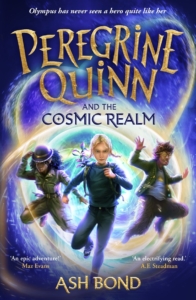
Enter the world of Peregrine Quinn: an interview with Ash Bond
Michelle Pauli steps through a portal to a magic world to interview Ash Bond about her debut novel, Peregrine Quinn and the Cosmic Realm.
‘If I could give any writer advice, it would be: don’t create a cast of immortal characters because you have to remember and grapple with thousands of years of backstory!’ declares Ash Bond, author of Peregrine Quinn and the Cosmic Realm. In that respect, Bond certainly hasn’t made life easy for herself with her debut novel, the first in series that seamlessly blends fantasy, sci-fi-and swathes of Greek mythology.
The eponymous Peregrine is an adventurous 12-year-old mortal and a rare human in a story packed with mythological creatures. She lives in the care of her godfather, Daedalus Bloom, a respected horticulturalist and Gardener’s Question Time regular who happens to remember the building of Stonehenge, given that he is a figure of antiquity who has made a life for himself in the Terran Realm – unusual for an immortal. Peregrine has been living an uneventful life in their Oxford flat until the day that Daedalus is kidnapped … and she discovers not only that there are portals between the Terran Realm and the Cosmic Realm but that they’ve suddenly closed down and only Daedalus can fix them.
It soon becomes clear that it is up to Peregrine to join forces with various creatures – not least a dryad, a faun, a nyad and a pot plant called Bernadette – armed with CosTech and facing down laser gun-wielding reptiles in a race against time to save not only Daedalus but humanity itself from ancient evil.
 If it sounds like a mad mash up – it is. It’s also fast-paced, funny and probably totally unlike any other middle grade book you’ve read recently, although it nods to Percy Jackson and Artemis Fowl.
If it sounds like a mad mash up – it is. It’s also fast-paced, funny and probably totally unlike any other middle grade book you’ve read recently, although it nods to Percy Jackson and Artemis Fowl.
‘The cosmic realm has a logic,’ insists Bond. ‘Things might be a bit bonkers, but they make sense. For example, a CosBug is an answer to a solution. You want surveillance technology that follows you around that could sit on someone’s shoulders? It would be a bug.’
For Bond, it felt natural to bring together science fiction and fantasy as a fusion of her interests, having grown up watching Star Wars and Star Trek, and reading lots of space operas. As she points out, they do all ‘play with what we might consider more fantasy tropes: spirituality, quests in going to different planets, monsters drawn from myth, folktales, folklore.’ Equally, there’s a strand of sci-fi in other children’s fantasy books but it’s less overt. She points to the Percy Jackson series as a mix of technology and fantasy – ‘he’s got a pen that turns into a sword! That’s pretty high tech as a gadget, but it’s just not really labelled as science fiction.’
However, while it might seem natural now, the tech/fantasy fusion that sparked the whole world of Peregrine Quinn came out of the blue. Bond was trying to write some ‘very dark and twisty YA with witches’ when a completely unrelated scene popped into her head.
She explains, ‘I had this image of a faun sitting on a desk with paperwork and maps all around him and drinking a coffee. He had something like an iPad in front of him and was looking quite harassed. Once you’ve got an image of a faun doing low-level administration using some kind of technology, you have an entire world opening up.’
He became one of the most appealing characters in the book, Callimachus Thorn, who must overcome his faun-like natural anxieties to do the right thing – and help save not only Peregrine but the entire Terran realm. Meanwhile, a dryad librarian, Rowan Strong, guards a portal into the cosmic realm. It was obvious to Bond that libraries had to have pride of place in the series.
‘What’s a book if not a portal into a magical world? And a guardian of a book is a librarian. So that’s what Rowan and her sisters do. They’re highly respected, highly trained people that guard these portals into this other world. My introduction into myth was somebody giving me a book. But then I was able to expand that by going into the library and finding other books and reading them – what a complete privilege and joy.’
That initial book was the Usborne Book of Greek Myths, given to Bond when she was six or seven by her mum, an act that was to shape her future. Captivated by the stories, she would later read encyclopaedias of myths in the library and go on to become became fascinated by classics. She took GCSE Classics a year early, despite her comprehensive state school not offering the subject. Instead, she’d take a bus after school, twice a week, to the private school where her mum worked, where her mum’s friend gave her lessons in return for her typing up all his class notes on her home word processor. Classics A Level, a Latin summer school and then a degree in Classics at Oxford University followed but ‘it really did just start with the stories’.
Following stints as a teacher in Malaysia, an outdoor adventure guide in China, a curriculum learning mentor in a school in Bristol and a yoga teacher, Bond is back full circle to myth with a PhD at the University of Bristol in myth and the relationship between myth and landscape and identity. As well as being a graduate teaching assistant, she is also writing a novel for adults that engages with the themes of the PhD.
And, of course, with a three-book deal from Piccadilly for Peregrine Quinn, Bond is busy writing more sci-fi-fantasy page-turners, and can promise that the second book is focused on ‘the cosmic games’, with a big tournament at the centre, while the third is based around a heist.
With an entire mythology of millennia-old characters, there’s certainly no shortage of stories. ‘All of these characters, they’ve all got these amazing backstories and histories and they’ve known each other in past lives, which is really exciting stuff. Even if I write 10 books, I’ll be only scratching the surface!’ says Bond.
Michelle Pauli is a freelance writer and editor specialising in books and education. She created and edited the Guardian children’s books site.
Peregrine Quinn and the Cosmic Realm is published by Piccadilly Press, 978-1800786806, £10.99 hbk.




